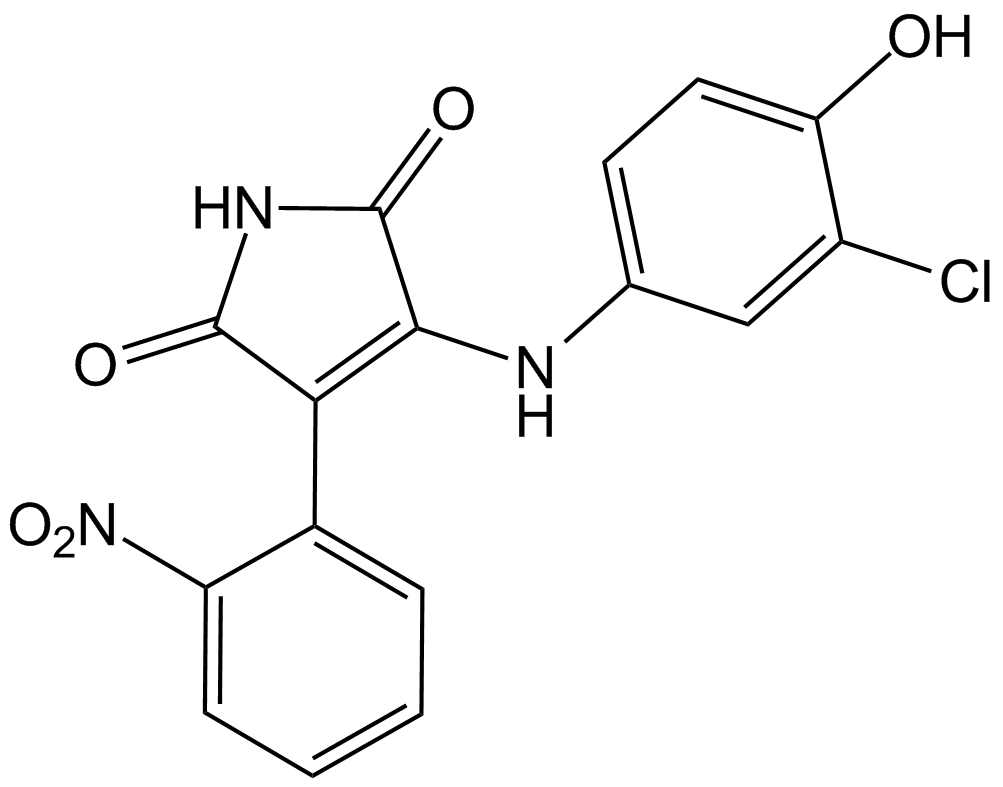SB 415286 |
| Catalog No.GC13028 |
A selective inhibitor of GSK-3
Products are for research use only. Not for human use. We do not sell to patients.

Cas No.: 264218-23-7
Sample solution is provided at 25 µL, 10mM.
SB-415286 is a potent and selective cell permeable inhibitor of glycogen synthase kinase-3 (GSK-3) with Ki of 31 nM. It shows similar potency against GSK-3 and GSK3β [1].
SB-415286 inhibited GSK-3 activity and promoted glycogen synthesis in human liver cells and induced expression of reporter gene regulated by catenin-LEF/TCF in HEK293 cells [1]. In primary neurons, it can prevent cell death induced by repressed PI3k pathway activity [2]. Further studies showed that reduced GSK3β activity induced by SB-415286 could inhibit down-regulation of cyclin D1, cell cycle arrest and chemosensitivity, which were all mediated by rapamycin [3]. Pharmacologic inhibition of GSK-3β dramatically impaired p53-dependent transactivation of p21 and Puma but facilitated p53-dependent conformational activation of Bax, resulting in the conversion of p53-mediated damage response from cell cycle arrest to apoptosis [4]. SB-415286 reduced ischemia-reperfusion injury by mechanisms which were associated with mitochondria. SB-415286 reduced adenine nucleotide transport and phosphorylation of VDAC, then increased Bcl-2 binding to mitochondria and blocked opening of the mitochondrial permeability transition pore in cardiomyocytes [5]. SB-415286 had protective effect of hippocampal neurons on radiation-induced apoptosis as well. GSK-3β inhibition induced by SB-415286 could result in the upregulation of MDM2, which, in turn, regulated p53 degradation and p53-dependent cellular responses [6].
Recent research in a mouse model further confirmed that SB-415286 is a neuroprotectant against radiation-induced central nervous system necrosis. Mice treated with SB415286 prior to irradiation (i.e. a single 45-Gy fraction targeted to the left hemisphere), showed significant protection from radiation-induced necrosis, which was determined by in vivo MRI, in contrast with DMSO-treated mice [7].
References:
Selective small molecule inhibitors of glycogen synthase kinase-3 modulate glycogen metabolism and gene transcription. Chem Biol. 2000 Oct;7(10):793-803.
Selective small-molecule inhibitors of glycogen synthase kinase-3 activity protect primary neurones from death. J Neurochem. 2001 Apr;77(1):94-102.
Role of glycogen synthase kinase 3beta in rapamycin-mediated cell cycle regulation and chemosensitivity. Cancer Res. 2005 Mar 1;65(5):1961-72.
Pharmacologic modulation of glycogen synthase kinase-3beta promotes p53-dependent apoptosis through a direct Bax-mediated mitochondrial pathway in colorectal cancer cells. Cancer Res. 2005 Oct 1;65(19):9012-20.
Glycogen synthase kinase 3 inhibition slows mitochondrial adenine nucleotide transport and regulates voltage-dependent anion channel phosphorylation. Circ Res. 2008 Oct 24;103(9):983-91. doi: 10.1161/CIRCRESAHA.108.178970. Epub 2008 Sep 18.
Glycogen synthase kinase 3β inhibitors protect hippocampal neurons from radiation-induced apoptosis by regulating MDM2-p53 pathway. Cell Death Differ. 2012 Mar;19(3):387-96. doi: 10.1038/cdd.2011.94. Epub 2011 Jul 8.
A GSK-3β inhibitor protects against radiation necrosis in mouse brain. Int J Radiat Oncol Biol Phys. 2014 Jul 15;89(4):714-21. doi: 10.1016/j.ijrobp.2014.04.018.
Average Rating: 5 (Based on Reviews and 30 reference(s) in Google Scholar.)
GLPBIO products are for RESEARCH USE ONLY. Please make sure your review or question is research based.
Required fields are marked with *




















